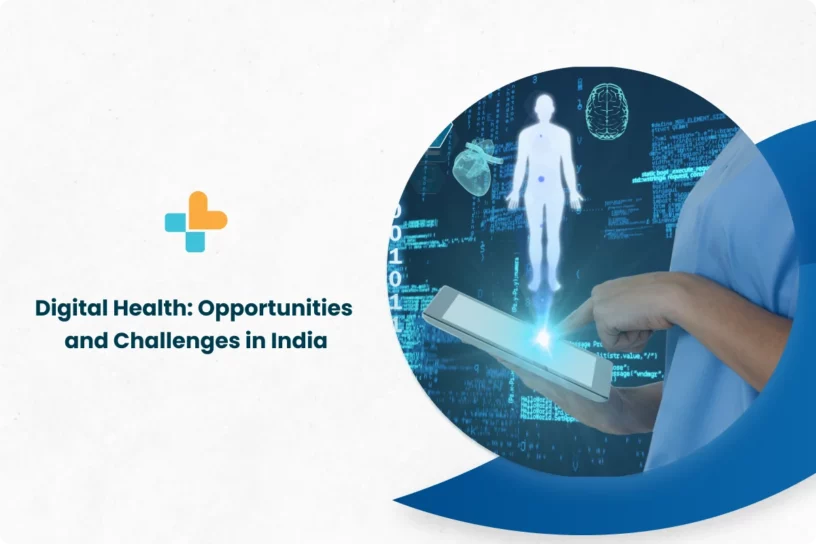A broad, interdisciplinary notion called “digital health” or “digital healthcare” comprises ideas from the point where technology and healthcare meet. Software, technology, and services are all part of digital health, which applies technology innovation to the healthcare industry.
Healthcare institutions are implementing advanced new health approaches. Global corporations can radically alter how healthcare is provided and the patient experience, regardless of the technology they are focusing on (cloud, EHRs, deep learning, AI, cybersecurity, etc.). The blog discusses digital health in detail, including its opportunities and challenges in India.
What is Digital Health?
The delivery of treatment by medical personnel, how patients access it, and also how medical facilities function are all being transformed by digital health. In simple words, digital health refers to the use of digital tools and resources to enhance the healthcare experience for patients. Along with the growing technology sector, the digital health market is equally booming. According to a 2021 report, the worldwide market for digital health will increase from 175 billion dollars in the year 2019 to around 660 billion in 2025. In fact, the space has created extra demand for skilled professionals, such as:
- Biomedical engineers
- Data scientists
- Software engineers
- UX designers
- Product engineers
A lot of us utilise digital health technology on a daily basis, whether we are aware of it or not. Users of wearable technology can receive regular reports on their activity, such as their heart rate, step count, calories lost, etc. via devices like smartwatches, for instance.
Types of Digital Health
Digital Health is an umbrella term, which includes several types, as mentioned below:
Electronic Medical Records (EMRs): Considered a digital version of medical records, EMRs contain vital data from a healthcare provider’s chart, such as medications, allergies, background, any diagnosis, etc.
Telemedicine: Telemedicine refers to the practice of providing care to patients over the phone or via video call.
Mobile Health/mHealth: Similar to telemedicine, mHealth refers to the use of mobile to access healthcare services. Mobile health technology allows people to interact with clinicians 24/7 for immediate question clarification, make appointments, and send secure communications swiftly and efficiently.
E-Prescribing: As the name suggests, this method involves electronically creating a prescription and delivering it to the patient or pharmacy.
Challenges in Digital Health in India
The health and medical sector has undergone a massive evolution in the past few years. The National Digital Health Mission already plans to make India self-reliant in this space. This has been made possible due to the entry of technology, by bringing together physicians, patients, and other parties on one platform and quickly becoming a remedy for the long-standing problems of affordability and accessibility. Despite the bright future for digital health, a few serious challenges are blocking the way.
Infrastructure-related issues
The absence of proper digital infrastructure and skilled professionals to run it has posed a major roadblock for the Indian digital health scenario. To encourage good management in the digital sphere, legislation should work to improve existing rules.
Low digital literacy
Nearly 60% of Indians living in rural areas still do not regularly use the internet. Lack of proper digital literacy is thus a major hindrance for such people, prohibiting them from accessing digital health services.
Ethical difficulties
The usage of data-gathering tools is growing, which presents various ethical concerns. For better accuracy and to provide medical suggestions, most e-health platforms are collecting, storing, and analysing patient data. Such actions give rise to privacy and ethical concerns.
Faulty AI and IT systems
Both AI and IT have major roles to play in constructing a strong digital health atmosphere. However, in India, AI is still in the developing stage. Sufficient experimentation on real-world data isn’t available to provide fully accurate results, thus decreasing the efficiency of digital health platforms ultimately.
Opportunities in Digital Health in India
By 2030, India may have 1 billion people using digital health services, benefiting from an inclusive healthcare system where access to care is increasing but costs are decreasing. Such a system will effectively prevent and continue to treat diseases and adapt care to each person’s lifestyle and disease characteristics at a reasonable cost. Opportunities are immense in this field. According to a report by Markets and Research, the Indian digital health market is expected to reach Rs.882.79 Billion by FY 2027. Solid frameworks such as National Digital Health Mission (NDHM) and Ayushman Bharat Health Account (ABHA) are already giving the digital push required.
Conclusion
The recent pandemic depicted how digital healthcare approaches can challenge traditional options. By facilitating major changes in medical treatment, digital health technologies will play a crucial role in the battle against the pandemic and any future ones. Ayu Health are one of the digitally equipped groups of healthcare providers in India, having the latest medical equipment as well as treatment options. Want to know more? Contact us at 6366100800 right away!
Our Hospital Locations
General Surgery Hospitals in Chandigarh | General Surgery Hospitals in Bangalore | General Surgery Hospitals in Jaipur | General Surgery Hospitals in NCR | General Surgery Hospitals in Hyderabad
Our Doctors
General Surgery Doctors in Chandigarh | General Surgery Doctors in Bangalore | General Surgery Doctors in Jaipur | General Surgery Doctors in NCR | General Surgery Doctors in Hyderabad
About the Author

Dr. S. Goel
Dr. S. Goel is a renowned Internal Medicine Specialist currently practicing at Ayu Health, Bangalore. He is a Specialist in Internal Medicine, Diabetes HTN, Paediatric Care, and Family Medicine.




